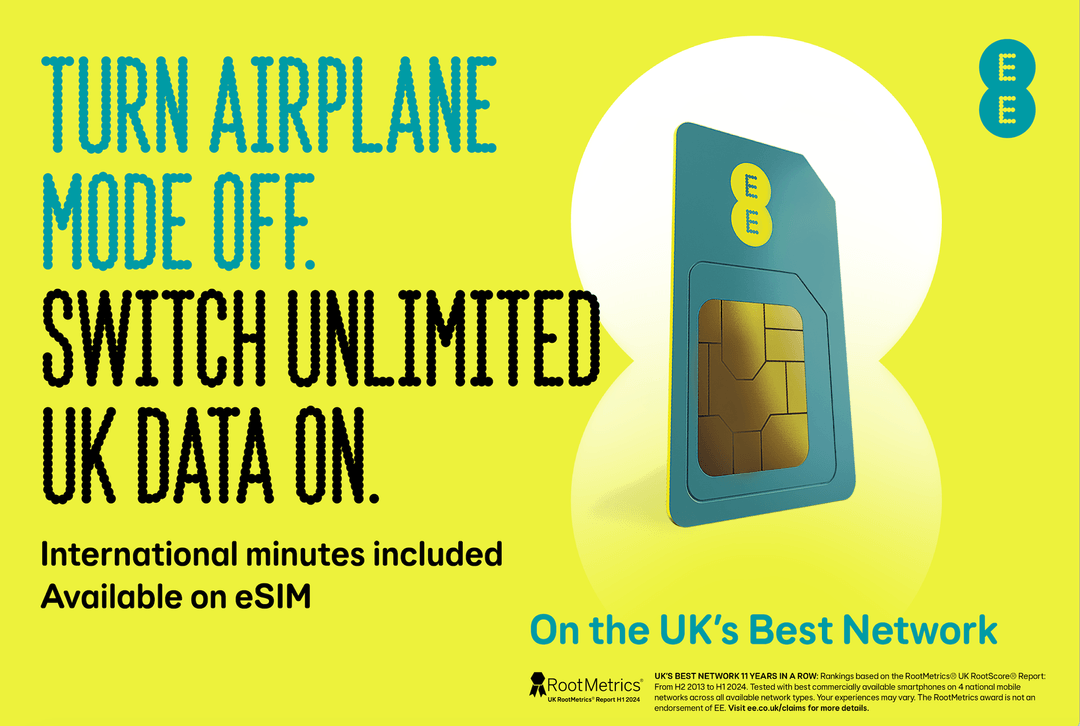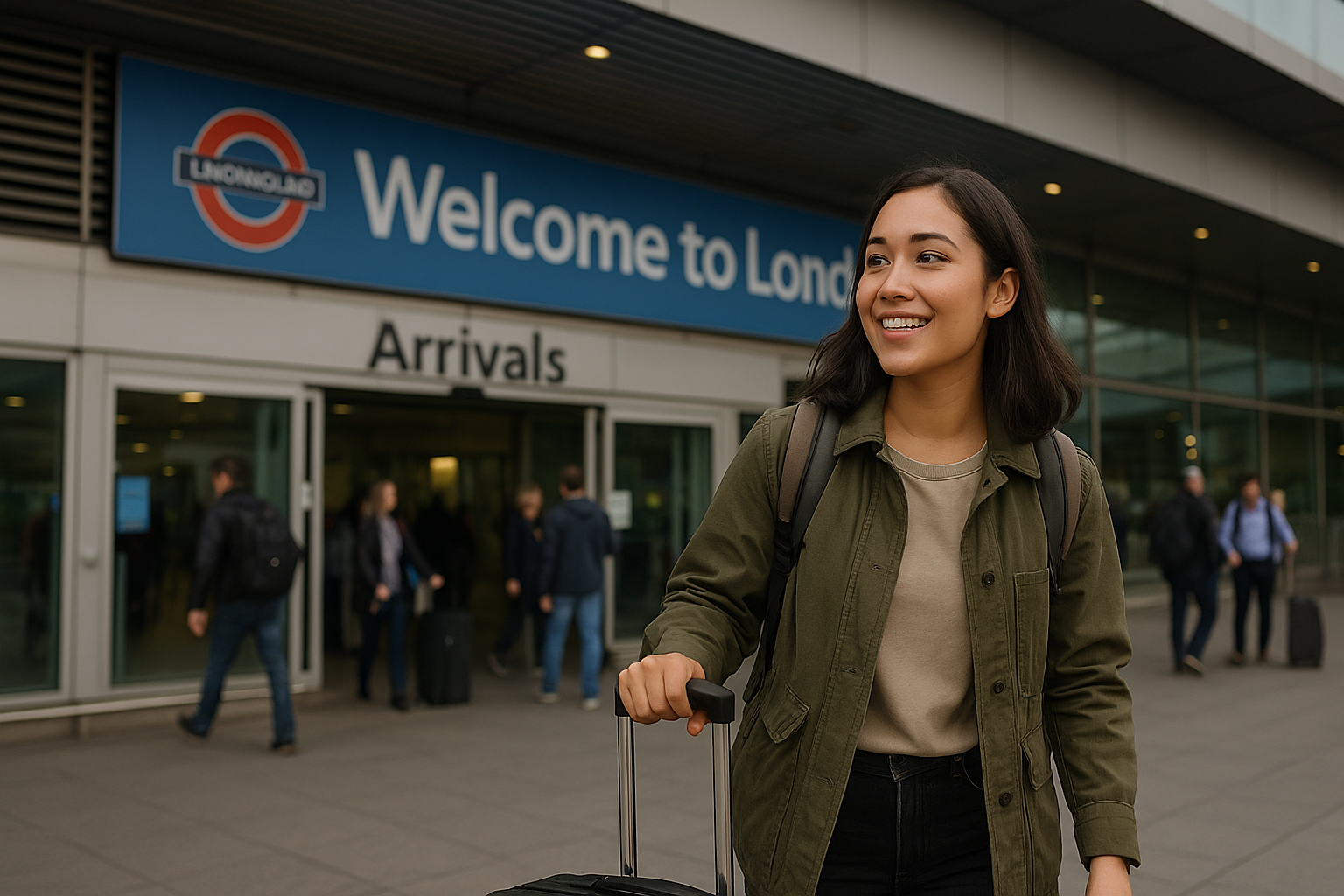 Top 4 EE Pay-As-You-Go eSIM Plans for UK Travel in 2025
Top 4 EE Pay-As-You-Go eSIM Plans for UK Travel in 2025The UK's fastest mobile network has a travel eSIM — available exclusively from Sim Local. Get your unlimited EE eSIM today.

So, you're thinking of making the move to the United Kingdom?
Whether it’s the buzz of London, the historic charm of Edinburgh, or the coastal vibes of Brighton calling your name, moving to the UK can feel like an exciting fresh start — or mildly terrifying.
Fear not. This guide has your back.
From visas to veggie roasts, SIM cards to slang, here’s the ultimate rundown on how to make your UK move as smooth as a pint of ale.
Short answer? Probably.
The UK isn’t the free-for-all it once was — unless you’re Irish (lucky you), you’ll most likely need a visa to work, study, or stay longer than six months. The visa you’ll need depends on why you’re moving:
Top Tip: The UK government’s Check if you need a visa tool is your best friend here. Use it.
If you’re coming from the EU, EEA, or Switzerland, the good old days of free movement are gone. Unless you’ve got settled or pre-settled status under the EU Settlement Scheme (if you lived in the UK before December 2020), you’ll need a visa like everyone else.
And from April 2025, even short visits will require an Electronic Travel Authorisation (ETA). It’s quick to apply for, but don’t leave it to the last minute — that’s not the kind of suspense anyone enjoys.
The UK’s Home Office is many things — fast is not always one of them. Visa processing times vary wildly, especially if extra documentation is requested (which it often is). Avoid the panic sweat and apply as early as possible.
Ah, house hunting. The rite of passage that unites all newcomers to the UK in a shared experience of scrolling Rightmove at 1 a.m. and wondering why the ‘spacious’ flat is basically a cupboard with a sink.
Smaller towns and cities like Leeds, Cardiff, Glasgow, or Belfast can offer better affordability, so don’t write them off.
Flat shares are super common, especially in big cities. Bonus: built-in social life (and someone to show you how the boiler works).
Unless you’re rolling in savings or planning to live your best retiree life, chances are you’re going to need a job. Here’s what you need to know to hit the ground running (or at least speed-walking).
The UK job market is competitive but lively, with plenty of opportunities — particularly if you’re in the right field. Sectors like healthcare, tech, education, and finance are actively hiring, and certain jobs are officially listed as ‘shortage occupations.’ That means employers in these areas are crying out for talent — and bonus, the visa process for these roles might even be a little smoother.
Pro tip: If your role is on the shortage occupation list, your employer might even help sponsor your visa — saving you a big chunk of hassle.
First thing’s first: it’s called a CV here, not a resume. UK CVs are generally 2 pages max, clear, concise, and focused on achievements. Forget the headshot (unless you’re in acting or modelling) and keep it professional but friendly.
Include:
UK interviews tend to be formal but polite. Expect competency-based questions like "Tell me about a time you solved a problem at work." Prepare examples using the STAR method (Situation, Task, Action, Result).
Dress code? Business smart unless told otherwise — even on Zoom.
Let’s talk about your phone. Because trust us, there’s nothing more frustrating than landing at Heathrow, desperately trying to load Google Maps, and realising your roaming fees could fund a small yacht.
The easiest way to get connected is with a UK SIM or eSIM. There are plenty of providers, but the big names are EE, Vodafone, Lycamobile, O2, and Three. eSIMs are a game-changer because you can download them in three minutes before you even get on the plane — no fiddling with tiny plastic cards.
Wi-Fi is pretty much everywhere in the UK: cafes, pubs, trains, even some buses. But be warned, not all free Wi-Fi is created equal. Your mileage may vary between ‘streaming Netflix in HD’ and ‘can’t even load Instagram Stories.’
At home, BT, Virgin Media, Sky, and TalkTalk are the main broadband providers. Installation times can be slow (a very British problem), so if you’re moving into a new place, check how soon you can get hooked up.
If you’re wondering, yes — WhatsApp is the go-to messaging app here. Forget about iMessage loyalty — Brits are all about the WhatsApp group chat (and the drama that comes with it).
Other handy apps for UK life:
Ah, the NHS — the beloved, slightly overstretched crown jewel of British life. Here’s what you need to know.
The National Health Service (NHS) offers healthcare that’s mostly free at the point of use for residents. But (and this is a big but) most visa holders have to pay the Immigration Health Surcharge (IHS) as part of their visa application. It’s about £776 per year for adults, and it gives you access to NHS services while you’re living in the UK.
As soon as you’ve got a UK address, register with a local GP (General Practitioner) — this is your first port of call for non-emergency health issues. It’s free to register and book appointments, but there might be a bit of a wait (bring a book, maybe two).
To register, you’ll usually need:
999 is for emergencies only — think life-threatening situations, accidents, or serious health crises.
For non-urgent medical advice, call 111 (NHS helpline). They’ll tell you whether you need to see a doctor, head to A&E, or just drink some water and take a nap.
You don’t need private health insurance, but some people choose to get it for:
If you’re employed, check if private health insurance is part of your job’s benefits package.
Because not all journeys to the UK look the same, here’s what you should know depending on where you’re coming from.
India and the UK have a long (and complicated) history — but these days, the connection is a lot friendlier, with strong migration links for work, study, and family life. Indian communities are thriving across the UK, especially in London, Leicester, Birmingham, and Manchester. You won’t have to go far to find Indian groceries, festivals like Diwali, or cricket fans to debate over the latest match.
There’s a strong Pakistani diaspora in the UK, with well-established communities and family connections — especially in cities like Bradford, Birmingham, London, and Manchester. The UK has excellent halal food availability, with many mosques and cultural centres. Ramadan is widely recognised in schools and workplaces, though practices may vary by region.
For student and work visas, you’ll need to show proof that you can support yourself — usually through recent bank statements meeting UKVI’s requirements.
Like Indian nationals, Pakistani applicants also need a TB test certificate as part of their visa application.
The UK is a top destination for Chinese students, with strong education links and a growing number of skilled workers making the move too.
While WeChat Pay and Alipay are the norm in China, they aren’t widely accepted in the UK. Bring an international credit/debit card and consider setting up a UK bank account (Monzo, Revolut, or Barclays are popular choices).
There are vibrant Chinese communities in London’s Chinatown, Manchester, Sheffield, and other major cities. Universities also offer Chinese student societies to help you feel at home.
The Nigerian diaspora is one of the largest African communities in the UK, with many people coming for education, healthcare work, or family reasons. Nigerian communities are well-established in London, Manchester, and Birmingham. You’ll find African markets, churches, cultural festivals, and plenty of ways to stay connected to home.
If you’re sending money between Nigeria and the UK, services like Wise, Remitly, and WorldRemit often offer better rates than traditional banks.
The UK and the US share a language (mostly), but there are still a few hurdles to clear when making the move. Prepare for British sarcasm, tea obsession, and smaller living spaces than you might be used to. Oh, and get ready to queue. Brits love a good orderly line.
The NHS is not automatically free for visa holders. You’ll need to pay the Immigration Health Surcharge (IHS) as part of your visa application — around £775 per year.
Post-Brexit life has changed the game for EU citizens moving to the UK, but plenty of Europeans are still making the move for work, study, and love. There are strong European communities across the UK, particularly Polish, Romanian, Spanish, French, and Italian groups in London, Birmingham, Manchester, and beyond. Cultural festivals and food markets are a great way to meet people and feel connected.
London might have the headlines for sky-high rent, but the UK overall can still give your wallet a workout. Here’s what to expect:
Always check what’s included — some rentals cover utilities, some don’t. Council tax adds a sneaky extra £80–£200 a month, depending on where you live.
Your weekly shop can vary wildly based on where you go:
Welcome to the land of tea, queuing, and mild weather panic. Even if you’ve visited before, living in the UK comes with its own set of cultural quirks that might surprise you (or at least give you a few "Wait, what?" moments).
The British don’t just queue — they excel at queuing. Whether it’s the post office, the pub, or the bus stop, the unspoken rule is: join the line and wait your turn. Cutting in? Social suicide.
Talking about the weather is the UK equivalent of "How are you?" Expect daily conversations like: "Bit grey today, isn’t it?" or "Lovely bit of sunshine we’re having." (Even if it’s just five minutes of sun between the drizzle.)
Pubs aren’t just for pints — they’re community hubs. You’ll find families having lunch, solo readers with a pint, or big groups watching football. Don’t miss the Sunday roast: beef, chicken, or veggie option, Yorkshire puddings, gravy, and enough roast potatoes to ruin your diet.
If you’re planning to drive, welcome to the left-hand side of the road — and the land of roundabouts. They’re everywhere. Don’t panic; you’ll get the hang of it (eventually).
Some useful translations for surviving daily conversations:
Alright, you've read the guide, sorted your visa, and (hopefully) picked out a waterproof jacket. Here’s your last-minute checklist to make sure nothing slips through the cracks before your UK adventure begins.
✅ Visa approved and printed copies saved — Have both digital and paper copies of your visa, BRP (if applicable), and any confirmation letters. Keep these handy — airport staff may want to see them.
✅ Accommodation sorted — Whether it’s a temporary Airbnb or your long-term dream flat, make sure you’ve got a UK address to give on arrival forms.
✅ UK phone number ready to go — You can get a new phone altogether, or a SIM-only plan. If your phone is eSIM ready, you can bypass the store visit and get an eSIM-only plan (with a real UK number) in about 3 minutes! If you plan on using an eSIM, see what some of the largest UK networks are offering, starting at £10 per month!
✅ Job lined up (or job hunt plan in place) — If you don’t have a job yet, have your CV polished and know where to start your search.
✅ Bank account research done — Many digital banks like Monzo and Revolut allow you to open an account with minimal hassle. Having one ready makes life (and rent payments) much easier.
✅ National Insurance number application prepared — If you’re working, you’ll need this. You can apply once you’re in the UK — but check what documents you’ll need.
✅ Health insurance or IHS payment confirmed — Double-check your Immigration Health Surcharge payment or make sure you’ve arranged private health insurance if required.
✅ Important documents scanned and saved securely — This includes your passport, visa, academic certificates, proof of funds, rental agreements, job offer letters, and anything else you might need. Cloud storage and a USB backup? Extra brownie points.
✅ Pack smart (and sensibly) — Remember, UK weather can throw all four seasons at you in a single day. Pack layers, a waterproof jacket, power adapters, and any prescription medications (with doctor’s notes if needed).
✅ Know your emergency numbers — 999 for emergencies, 111 for non-urgent health advice. Save these in your phone.
💬This is the first incarnation of our guide. Got any experiences, tips, or questions you think should make it into the next update? We’re all ears. Jump into the moving to the UK thread and share your thoughts.
 Top 4 EE Pay-As-You-Go eSIM Plans for UK Travel in 2025
Top 4 EE Pay-As-You-Go eSIM Plans for UK Travel in 2025The UK's fastest mobile network has a travel eSIM — available exclusively from Sim Local. Get your unlimited EE eSIM today.
 What Is an eSIM UK? Your Guide to Cheaper, Smarter Travel Data
What Is an eSIM UK? Your Guide to Cheaper, Smarter Travel DataDiscover what a UK eSIM is, how it works and why it’s a smarter way to stay connected. This guide breaks down everything travellers need to know with no jargon, just real info and instant solutions from Sim Local.
 Best eSIMs for Travel in Europe (2025)
Best eSIMs for Travel in Europe (2025)Our top 6 eSIMs for travel in Europe. And other things to consider...
Destination
Shop
About
Help
Contacts:
© 2025 Sim Local (IRELAND) Ltd. All Rights Reserved.